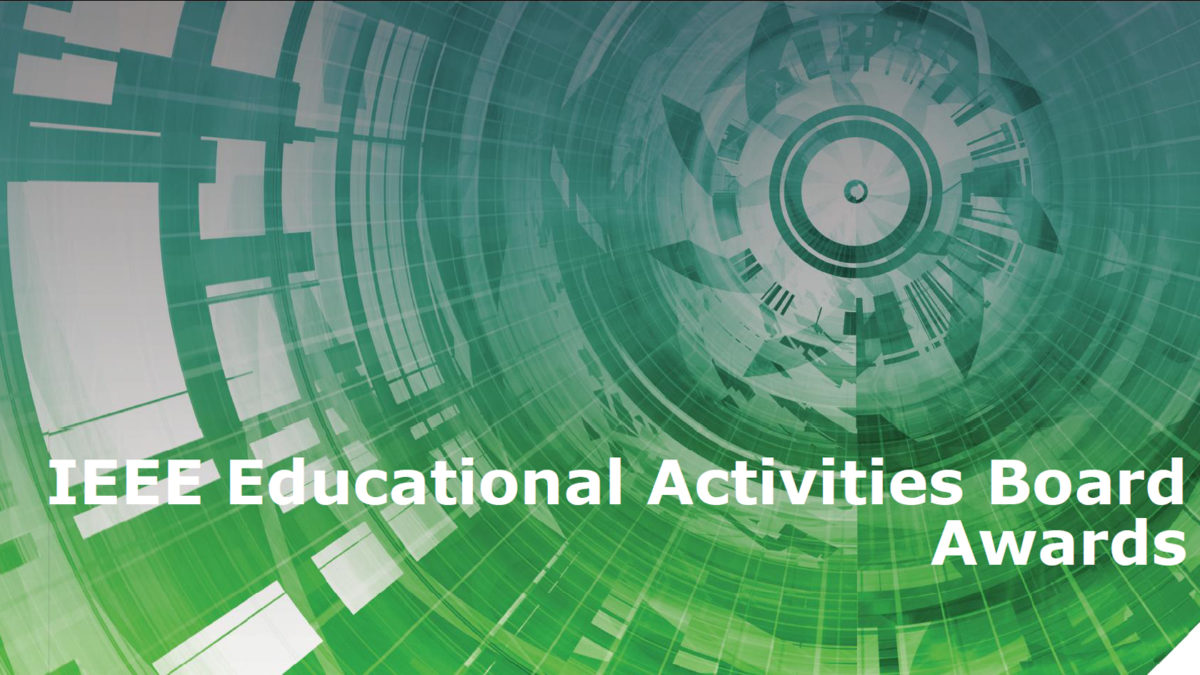The deadline for IEEE Educational Activities Board Awards is Monday 4 May, 2020
IEEE Educational Activities Board (EAB) Awards recognize and honor major contributions to engineering and technical education. Awards are given for meritorious activities in accreditation, continuing education, educational innovation, pre-university education, service to the IEEE EAB, employee professional development, informal education systems, and related achievements that advance the practice of engineering and of engineering education.
But, EAB doesn’t only recognize and honor individuals.
The Section Professional Development Award recognizes an IEEE Section for major contributions to the professional development of its members through the provision of outstanding products, services, and support in the areas of life-long learning, continuing education, and professional development.

Region 8 Today spoke with Sohaib Sheikh who is the Chair of the IEEE Educational Activities Board Awards and Recognition Committee and had the chance to ask a set of burning questions and below are his answers.
What types of awards are there?
There are a total of 14 awards which recognize and honor major contributions to engineering and technical education. Awards are given for meritorious activities in accreditation, continuing education, educational innovation, pre-university education, service to the IEEE EAB, employee professional development, informal education systems, and related achievements that advance the practice of engineering and of engineering education.
We also have the IEEE Life Members Graduate Study Fellowship in Electrical Engineering which is awarded to a first year, full-time graduate student for work in any area of electrical engineering at an engineering school/program of recognized standing worldwide.
All winners of these prestigious awards are invited to the EAB Awards Ceremony which, this year in November, is planned to be held in Redmond, USA.
What is the deadline for the awards and where can we find more information about them?
The deadline for the awards is 4 May, 2020 and information, including the nomination process, can be found here: https://ieee.secure-platform.com/a/page/major_board_awards/Educational_Activities
Are nominees from all Regions allowed?
Yes, members and in many cases, non-members from all over the world are eligible to be nominated for all awards and the fellowship. We have only one scholarship which is restricted to the US only.
Can you describe us the process that is held to select the award recipient?
EAB has an Awards and Recognition Committee who’s members meticulously review all nominations and provide their scores and feedback individually. Afterwards, the full committee meets face to face to review the feedback together and choose winners.
What makes the selection process fair, consistent and reliable ?
We are keen to ensure that we eliminate any bias from the selection process, and make the awards selection fair. To do this, we have a two-step process:
1. As a policy, individuals serving on any board or committee involved at any stage of the recipient selection or approval process for an award are ineligible to receive or act as a nominator or reference for the awards.
2. We review and discuss as a committee, all scores and feedback given by individual judges, and choose winners based on merit.
Is it important to be nominated by a well known person or it doesn’t matter who the nominator is?
It doesn’t matter if the nominator is well known within IEEE or to the general public. What matters is that the nominator knows the nominee well and can prepare a good nomination pack. Same goes for referees as well.
How many nominations does the awards committee receive per year?
This is internal data, so, unfortunately, I cannot fully share it but I can state that different awards receive different numbers of nominations. Some awards like Pre-University Education, Section Professional Development and our Fellowship are usually very popular.
Is there something that you’d like to add ? a comment, a statement?
We generally know many individuals/organizations/IEEE OUs who are eligible and deserving for these awards. I would highly recommend that you nominate them to give them an opportunity to be recognized for all of their hard work.
We do not allow self-nominations so it’s even more important that you nominate those who you know are doing well in the relevant areas. The nomination process doesn’t take much and allows quick inputs.
I would also like to wish you all health and safety in these current times!
You know deserving individuals. Who will you nominate?
Award nominations, as well as applications for the Charles LeGeyt Fortescue Scholarship and the IEEE Life Members Graduate Study Fellowship in Electrical Engineering, are open.
Nominate someone today by following the link below:
https://ieee.secure-platform.com/a/page/major_board_awards/Educational_Activities

